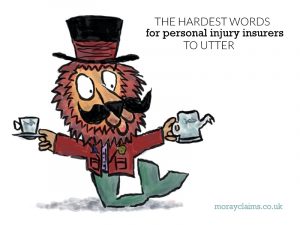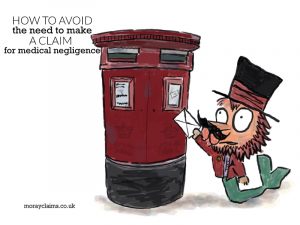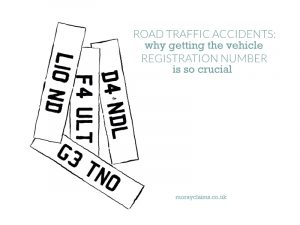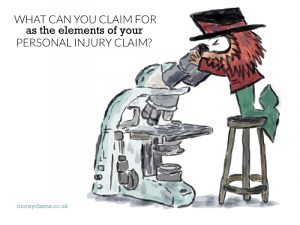If you like words and plays on words, the internet is a mine of nuggets. For example, in India, “Sari” always seems to be the hardest word. If you’re looking for “alternative” definitions of words, the Uxbridge English Dictionary (from BBC Radio 4’s I’m Sorry I Haven’t A Clue) has examples such as: Words are not always what they seem. The “plain meaning” of a word is rarely a given. The meaning of words can be twisted or ignored. In this article, we’ll consider 3 words / phrases which insurers in personal injury claim situations will avoid using if they can and will twist as far as possible if they cannot be avoided. What are these "unforgivable" words / phrases? We’ll get to them in a moment. First, we need to understand the context in which the problematic terminology arises. Your personal injury solicitor wants to achieve for you the highest level of compensation reasonably possible, as soon as reasonably possible. There are various tactics your solicitor Continue Reading
Claims for Death of a Relative in Scotland – Another milestone?
Elgin's Dandy Lion has not had a view up the High Street to Dr Gray's Hospital since May 2018. In the meantime, his view has been blocked by wooden hoardings as Poundland first had structural problems and then a fire. We’ve had piles of metal on the site, from the “scaffolding mountain” to the beginnings of the new Poundland construction. In the various photos below, there is a similarity but there's also gradual progress. In the law relating to bereavement compensation in Scotland, there can be a superficial sameness to things but, again, under the surface, there is progress and milestones are being achieved. We’ll look at one of these progression points in this article. For fatal accident claims, in Scotland, this is one area where the law is quite different to that in England and Wales. This is particularly the case for compensation awarded for the grief and sorrow caused by deceased’s death – often referred to as compensation for “loss of society”. Those pushing Continue Reading
How to avoid the need to make a Medical Negligence Claim
The world record for longest time between a message in a bottle being sent and received is 132 years. 1886 to 2018. It was “posted” as part of research project into ocean shipping routes. The glass container was thrown overboard from a German vessel in the Indian Ocean, washing up on a remote Western Australian beach. If your letter requires someone else to take action, a delay of 100 years or more in someone reading the letter is not going to be good news for you. When you send a letter, you expect it will be received and read within a few days. We all understand that this is how the world works but what if a letter gets lost or delayed? – or is never even sent in the first place. How does this relate to claims for medical negligence? Well, it’s better to avoid having the need to make a personal injury compensation claim – including a medical negligence claim – than to have to go down that road at all. Claims are stressful and compensation levels - even Continue Reading
Why it is best to get your choice of personal injury solicitor right first time
Filmmakers have a wide variety of camera techniques at their disposal to help them tell their story to best effect. One of the most powerful tools directors can employ is the split diopter lens, which makes it possible to have two subjects at different distances in the frame simultaneously – and both in focus. In his 1951 film, Strangers on a Train, Alfred Hitchcock wanted a telephone to be in a foreground close-up while actors in the background remained in focus. This was to emphasise the importance of the incoming phone call. The limitations of camera lenses at the time meant he could not make it work. He fixed the problem by having a giant phone in the foreground and putting a regular-sized phone in Ruth Roman’s hand as she came to answer it. The camera view tilted up as she approached (moving the monster phone out of shot). The 1984 film comedy, Top Secret, spoofed that set-up, with the foreground telephone remaining in shot throughout and the army officer Continue Reading
Why the crucial road accident information to get is the registration number
If you have been injured as a result of a road traffic accident, although it is the driver of the vehicle at fault for the accident who bears the blame, it is their insurance company that will pay your compensation in most cases. As a result, you and your solicitors want to find out as quickly as possible who those insurers are and how best to contact them. There is a lot of information you can usefully gather to give to your solicitor following a road traffic accident but what do you think is the single most important piece of information? What you absolutely want to get if you can is the registration number of the vehicle which caused the accident. This applies whether you were In the “best case”, you will be well enough and quick-witted enough to get the registration number yourself. But that won’t always be the case, especially if you have been seriously hurt in the accident. In this article, we will look at three reasons why getting the registration number Continue Reading
How Grigor & Young help you with an accident-on-premises claim in Moray
Grigor & Young LLP, Solicitors, use Moray Claims as a trading name in their business of dealing with personal injury compensation claims for clients. Grigor & Young have offices in Elgin and Forres, Moray. Claims arising from accidents on premises are usually against the person or business which has control over the land or buildings in question. Injuries resulting from accidents on premises – also known as occupiers’ liability claims – can result in a wide variety of ways. If we take on your claim at G&Y, it will be via one of the following three funding methods. Legal aid Your eligibility for legal aid depends upon your financial circumstances. If you qualify for legal aid, we will look closely at using that as the funding mechanism for the claim though we will also discuss with you the other options mentioned below. It is worth noting that, if your claim is successful under any form of Scottish legal aid, you will receive 100% of your Continue Reading
How Grigor & Young help you with a road traffic accident injury claim in Moray
Grigor & Young LLP, Solicitors, use Moray Claims as a trading name in their business of dealing with personal injury compensation claims for clients. Grigor & Young have offices in Elgin and Forres, Moray. Personal injury compensation claims arising from road traffic accidents are usually against insurers of the driver who was to blame for the accident. If that driver was uninsured or is untraced, the claim may be against the Motor Insurers' Bureau. Injuries resulting from road traffic accidents can happen in many different ways. If we take on your claim at G&Y, it will be via one of the following three funding methods. Legal aid Whether you qualify for legal aid depends upon your financial circumstances. If you qualify for legal aid, we will give close consideration to using that as the funding mechanism for the claim though we will also discuss with you the other options mentioned below. Note that, if your claim is successful under any form Continue Reading
How Grigor & Young will help you with your accident at work claim in Moray
Moray Claims is a trading name of Grigor & Young LLP, Solicitors. Grigor & Young have offices in Elgin and Forres, Moray. Accidents at work cover a wide range of accidents. If we take on your claim at G&Y, we will do so in one of three ways. Legal aid Eligibility for legal aid will depend on your financial circumstances. If you qualify for legal aid, we will give serious consideration to using that as the funding mechanism for the claim but we will also discuss with you the other options mentioned below. Note that if your claim is successful under any form of Scottish legal aid, you will receive 100% of your compensation. The legal aid rules prevent your solicitor taking any form of Success Fee as a deduction from your compensation. "Before the event" (BTE) insurance This is a type of legal expenses insurance which you may have attached to buildings or contents insurance, for example. Many people have this type of legal expenses insurance cover Continue Reading
How pain and suffering valuation guidelines underpin personal injury claims
What do you do if you’re sailing and your mast breaks? In the 2013 Atlantic Rally for Cruisers, in which small sailing vessels travel from Gran Canaria to the Carribbean, that happened to one of the participating boats. Pollux, from France, with her 2-man crew was only 140 miles from her final destination of St. Lucia, when she was dismasted in a heavy squall. The crew did not panic. Applying the concept of ‘jury-rigging’ – a term used to describe the actions of makeshift running repairs made with only the tools and materials on board – they rigged a windsurfing sail as a temporary replacement on their remaining “half mast”. It helped that the final stretch was downwind and, in the end, they lost remarkably little time because of the mishap. A few adaptations and they still achieved the desired result – getting “home”. But without the enforced adaptations they would not have made it to their destination. In valuing personal injury claims in Scotland, it can sometimes Continue Reading
Guess the Song with the Lawyer in it
The Elgin Gift Card, is the perfect gift or treat. While a normal gift card can be used only at one business, the Elgin Gift Card can be used at any one of more than 80 participating city centre businesses.Simply look on the Gift Card Map to see the businesses involved and decide what you want to do: have your lunch or dinner,put it towards a holiday,indulge yourself in a bit of luxury,get something for the house,get your hair done, orbuy clothes – it’s that simple and the choice is yours. You can buy your gift cards atiFix Phone Repairs- Batchen Street, Gordon & MacPhail – South Street or online. Soon, you can also have the chance to win a £10 Elgin Gift Card every week through Moray Claims on Facebook. This weekly competition will post a short excerpt of song lyrics which mention the word “lawyer” in them and all you have to do is be the first to correctly identify the name of the song in order to win. The first person to post the Continue Reading
Whiplash Claim in Scotland? Make sure you apply the right rules
In Scotland, we are used to being lumped in with England and other parts of the UK in all sorts of situations where that may be misleading or even wrong. Sometimes the law is the same in Scotland as in the rest of the UK and sometimes it’s not. Personal injury claims are usually based upon negligence of one person causing injury to another. The modern law of negligence for the UK (and much of the world) is based on the Scottish “snail in the ginger beer bottle” case of Donoghue –v- Stevenson. But some areas of personal injury law differ markedly between the jurisdictions. For example, the law relating to claims in cases of fatal accidents and payment of bereavement damages to relatives of deceased persons. Scotland has had a more ‘generous’ compensation scheme in this type of case than the rest of the UK for a long time. But one area where there has been a parting of the ways between Scotland, on the one hand, and England and Wales, on the other, has come as recently as May Continue Reading
What all can you claim for with a personal injury claim?
The style of lettering you use for words can have life and death consequences. Research by the AgeLab at Massachussetts Institute of Technology (MIT) has noted how car dashboard interfaces, if designed correctly, should minimise the amount of time the driver has to spend looking at them. The longer you take to work out what's on the screen, the less time you're looking at the road. Some typefaces are rigid and uniform. Their letters and numbers can look highly similar to each other. But other typefaces have much more open spacing and varied letter shapes. These latter fonts can shave precious milliseconds off the time drivers spend looking away from the road. Getting this form of visual communication right is important because the consequences for vehicle travellers' safety could be serious. With personal injury claims, one thing you need to get right in order to avoid potentially serious consequences is the valuation of the claim. With personal injury claims, your Continue Reading








